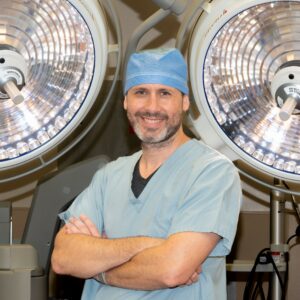
Devin J Cross MS, CNIM, Sr SN III, Clinical Instructor
Mentorship is a key vehicle for passing down clinical professionalism, experience, and expertise in a medical environment. It’s a distinctive part of how SpecialtyCare trains professionals and how we engage with other clinicians at hospitals around the country. We recently interviewed Clinical Instructor Devin J. Cross, MS, CNIM, Sr SN III, to get his take on the rewarding nature of mentorship, especially within the context of our team and model. Devin is an IONM expert who has helped others gain real-time feedback, experience, and confidence in diverse clinical and surgical settings.
Benefits of Mentorship in IONM
“Intraoperative monitoring is very different from most careers and comes with a set of values that are important for daily operations to go smoothly,” says Devin. “The model for training at SpecialtyCare is especially beneficial for a trainee by having a mentor in the field that complements the quality of education from the classroom.”
He explains just a few of the benefits:
- The one-on-one relationship allows for in-depth discussion of concepts learned during the course work.
- Repetitive practice with a mentor on principles of scientific mechanisms can ensure a trainee is meeting their goals and keeping up with the high-quality standards of training at SpecialtyCare.
- Mentorship can help solidify a deeper understanding of how principles are applied to clinical practice.
“There are many ways to approach the methodology and organization of neurophysiological monitoring, and having a great mentor to work with will teach those highly specialized trade secrets that are vital to becoming a preferred provider at our institutions,” says Devin.
How Mentorship Elevates Performance
Mentorship provides stepping stones for trainees, allowing them to make progress in the complex field of IONM without burning out. “Training in intraoperative neuromonitoring can be extremely tough given the extensive knowledge and experience that is required to perform successfully every day,” says Devin. “It is important for a mentor to keep a trainee motivated by providing a balance of explicit directional control and allowing innovative creativity to explore new ways of achieving our tasks.
 “Training is reduced to smaller objectives to concentrate on mastering key concepts that work towards big leaps in understanding the vast scope of medical practice. It can be easy to feel overwhelmed, but I have found that implementing daily positive reinforcement techniques can be extremely effective motivation.
“Training is reduced to smaller objectives to concentrate on mastering key concepts that work towards big leaps in understanding the vast scope of medical practice. It can be easy to feel overwhelmed, but I have found that implementing daily positive reinforcement techniques can be extremely effective motivation.
“When a trainee feels good about their daily incremental improvements, then they are often eager to come back the next day and work even harder to achieve the next goal. This builds on confidence and strengthens the relationship with the clinical instructor, which is pivotal for a beneficial experience during the training process.”
Giving Confidence and Navigating Challenges
The nature of the one-on-one relationship provides mentors with insight about their trainees’ capability. They know when their students need to be challenged so that their full potential can be realized. “A good mentor is a professional resource that can guide and support a trainee, but also knows when to provide a challenge to further their independence. Our surgeons rely on our meticulous attention to detail of the neurophysiological data. The particular language chosen and style of presentation of that data can be transformative for building trust with our surgeons.
“It can take a long time to develop the kind of confidence required to discuss neurophysiological data and it is particularly difficult to teach. For some it has taken an entire career to develop the dialogue that is critical for optimal communication with a surgeon.

Tiffany Withrow SN II Local Neurosurgical Conference
“Often the operating room is a completely new environment for a trainee and a mentor can help provide an extra level of comfort when inevitable feelings of inadequacy take over. It is unnecessary to put trainees in situations they are unprepared for, but during challenging experiences they always have a skilled mentor to back them up and ensure the technicalities of neuromonitoring go smoothly for our providers.”
Mentors face their own challenges, too — which helps them grow as professionals. “It can be difficult for a mentor to let go of control and find the right moment to let a trainee take the primary role,” says Devin. “Good communication and rapport with your trainees are essential when assessing each individual’s needs.”
Fulfilling Moments in Mentorship
Devin knows the great rewards of mentorship, especially how it feels to see your trainees succeed after periods of hard learning. “During pivotal moments in the operating room, knowing when a trainee is ready to show off their skills can be particularly rewarding. Although the mentorship may continue during the professional career of a neurophysiologist, I have felt an overwhelming amount of satisfaction observing a former trainee perform independently. The transition point from trainee to coworker can be one of the most fulfilling experiences as a mentor,” says Devin.
He learns from his trainees, too. “Sometimes I have discovered a former trainee implementing new tools or techniques that enable accelerated time management or superior functional implementations that can benefit my own daily practice. On numerous occasions, a surgeon has bragged to me about how exceptional it is to work with one of my former trainees, and I know I cannot take full credit for their outstanding performance, but it is a source of pride to have contributed to their professional development.

Eugene Castro Sr SN I, Wedding with the best man
“I am particularly proud that one of my trainees has become the clinical manager in my own territory. We both continue to improve our practice in neurophysiology together as professional colleagues, and he has become an extraordinary leader. Mentorship is so incredibly personal. I am fortunate that some of my trainees have become long-lasting friends and I even asked one to be the best man at my wedding (he said yes).”
Grow in Mentorship When You Join Our Team
At SpecialtyCare, we’re proud of how our team members engage in mentorship opportunities. Our model is focused on developing professionals so that they grow as people and excel in clinical practice. When you join our team, you can engage in a mentorship opportunity — whether you’d like to learn new skills or start teaching others. We consider it absolutely necessary for providing a high level of service to all our partners and helping our team members thrive in their careers.
“Mentorship is a responsibility to provide a model of professionalism and translate a specialized scope of knowledge for a trainee to absorb on a daily basis,” says Devin. “The mentor relationship is such a unique opportunity to guide a new coworker on a journey of mastery and help mold, promote, and incorporate standards of professional conduct in the field.”
